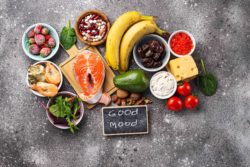Food for Mood
Food and Mood by Emma Dawson

Why is food important for my mood?
To make the happy hormones serotonin (for happiness), dopamine (to feel amazing) and gaba (for relaxation), and to make the thyroid work (for energy), we need to eat an array of nutrients, including proteins, fats, vitamins B, C, D, zinc, iodine, magnesium and iron.
What food should I eat?
By eating a rainbow of varied organic, homemade or freshly-made wholefoods, you naturally increase the nutrients you eat. Try a plate that’s made up as follows:
½ vegetables
¼ protein rich foods, such as soy (tofu, tempeh), pulses, fish, meat, poultry, nuts, seeds and eggs
¼ root vegetables, whole grains or pulses
Choose green for happiness
B vitamins are vital for making our feel-good hormones. After the festive season, these hormones are reduced by alcohol, sugar and stress. Green vegetables, such as organic kale, broccoli, spring greens, cabbage and sprouts, are good sources of thiamine—the B vitamin most affected by alcohol.
How to cook for health
B vitamins are water-soluble, which means that if boiled these nutrients may be lost in the water. Steaming with a lid on is a better alternative.
Stir-fry
My favourite way to cook mood-boosting food is by stir-frying an array of vegetables, alongside cubed tempeh or tofu, chicken, fish fillet, or tinned fish (not tuna) for ease. I fry using extra virgin olive oil and a little water.
Fats for the brain
The brain is 60% fat; some of these are ‘essential’. This means that they have to be eaten; we cannot make them unless we eat the right foods. Low levels of omega 3 essential fats are associated with anxiety, depression and even dementia.
Foods for essential omega 3 fats
Seafood: Sardines, salmon, mackerel, herring, trout and anchovies are the best food sources, as well as the vegan option sea algae, available in supplement form. Other than tuna, where most of the omega 3 is lost in the canning, tinned fish in sustainable ranges such as Fishforever are handy options.
Seeds: Flaxseeds, edamame beans, walnuts, chia seeds and hemp contain the precursor for these fats, however, is harder to process the oils from these vegan sources, with as little as 5% being converted.
Organic dairy and meat, as well as free range eggs: These have significantly less omega 3 than seafood, but recent studies in the British Journal of Nutrition found that they contain around 50% more than non-organic varieties. Be wary of ‘Omega 3 Eggs’: these may be produced from caged hens being fed flaxseeds.
Vegan or don’t eat oily fish?
- Use flax oil in salads or smoothies
- Grind your own flaxseeds and keep them in an airtight container
- Include a variety of nuts and seeds in your diet
- Consider vegan omega 3 supplementation
What about vitamin D?
Decreased levels of vitamin D are associated with low mood and seasonal affective disorder (SAD). The best way to get vitamin D is from the sun. Oily fish (see above) is a good food source, with smaller amounts found in mushrooms, free range eggs, organic meat and dairy. Remember, vitamin D production requires sunlight, so animals that roam freely will provide more. Public Health England recommends that everybody supplements vitamin D in the winter.
The genetic link and tests
Do you feel you have a tendency to feel low? We all have gene variants that may affect our ability to absorb or use nutrients needed to make our happy hormones, resulting in a tendency for depression or anxiety. If this is you, consider working with a nutritional therapist and completing recommended tests.
My top tips
- Tweak your meals to include extra protein, vegetables and healthy fats
- Eat at least one handful of organic greens each day
- Replace sugary snacks with savoury ones, such as a handful of nuts
- Consider supplementation, including vitamin D and omega 3 essential oils. Do this in conjunction with consulting a nutritionist, to make the best choices.
- If you are taking medication or have a planned operation and are buying supplements in a store, always check with the seller whether there is any conflict. Remember, supplements are chemicals too.
Emma Dawson is a Registered Nutritional Therapist, specialising in peri- and post-menopause, anxiety and depression.
If you’re struggling with low mood, anxiety, mood swings, energy dips, brain fog, poor memory or disrupted sleep, personalised guidance, advice and support can help you get the optimum nutrition you need to feel better.
Emma offers one-to-one packages, talks and workshops, including Food and Mood courses with EFT Coach Hannah Currant
Contact Emma at:
emma@nutritionalbalance.co.uk
www.nutritionalbalance.co.uk
07980 644108
References:
https://www.soilassociation.org/organic-living/why-organic/its-nutritionally-different/
?rednicka-Tober, D., Bara?ski, M., Seal, C., Sanderson, R., Benbrook, C., Steinshamn, H., . . . Leifert, C. (2016). Composition differences between organic and conventional meat: A systematic literature review and meta-analysis. British Journal of Nutrition, 115(6), 994-1011. doi:10.1017/S0007114515005073
?rednicka-Tober, D., Bara?ski, M., Seal, C., Sanderson, R., Benbrook, C., Steinshamn, H., . . . Leifert, C. (2016). Higher PUFA and n-3 PUFA, conjugated linoleic acid, ?-tocopherol and iron, but lower iodine and selenium concentrations in organic milk: A systematic literature review and meta- and redundancy analyses. British Journal of Nutrition, 115(6), 1043-1060. doi:10.1017/S0007114516000349
